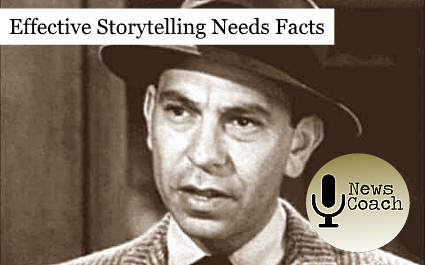Effective Story Telling Needs Facts

This is the fourth in a series, aimed primarily at print and radio
reporters who are asked to produce video reports. For multimedia
journalists, these skills are a must. And for video reporters, it's a
reminder of key elements that can make your stories stand out.
Read part one A video primer for print journalists here.
Read part two Crossing over:
Audio advice for print reporters here.
Storytelling was one of the forces wooing me into video journalism about
35 years ago.
It can be a terrific framework for certain news events.
But sometimes the fundamentals of journalism can become overshadowed, or
even neglected by our narrative choices. The best reporters who rise to the
top will always be those who dig for the real story and keep their antennae
out for warning flags. They may write in a storytelling style when it works
but this doesn’t distract them from their real job.
An oft-repeated
newsroom maxim uses sarcasm make a point: "Don't let the facts get in the
way of a good story." Facts will always be the cornerstone of what we as
reporters need to convey to our audience. With this said, please remain
vigilant against letting style overtake substance. Don’t let your smart
reporting suffer from the urge to be the best storyteller in the universe.
Here are a few examples that left me with unanswered questions:
- So
sad: A delivery truck loses control and hits shoppers at a farmers Market.
I’m watching all the colorful fruits and vegetables scattered about. I hear
from witnesses. I learn the status of the victims and possible reasons that
might have caused the truck to misbehave. Hmm. Isn’t that area on a street
that’s a shortcut to circumvent traffic? What are the delivery rules for the
market? How many accidents have we had there? Any market spot in particular?
Can these streets accommodate the trucks? Should traffic changes on these
days be considered? Has any neighbor or anyone in local government talked
about this yet?
- A beaming elderly volunteer is retiring
from a major donations clearing house. He’s the greatest! His wife, family
and workers are beaming, some are teary, others sing his praises. The cake
looks great. Who is this guy really? Did he have a different job earlier on?
What drove him to be so dedicated? Any insight from him- or someone else? Is
his long record of volunteerism standard? How does it reflect nationwide
stats on volunteerism?
- A thief enters a home. “It never happens here!” says a neighbor. The family is shaken. They’ve lost things that they need, and that are important to them. We learn how the thief probably got in. The police are still looking for the bad guy or bad guys. Hmm. Any ideas as to why this cunning theft happened? What’re the local crime stats? Any patterns that may shed some insight? How’s the local economy doing? Have police noticed upticks in particular types of crimes or arrests? Do they have any home safety tips for us that we might never have thought about?
I think you catch my drift. And it just occurred to me,
maybe this is why I like historical novels. We’re pulled in by the narrative
and by the lives of the protagonists but we get smart as well. We learn
greater detail about a period in time.
Getting caught up in the
tools of storytelling tends to effect reporters who are newer to the game.
Great nat sound! Compelling sound bites. Eye-catching video. But for truly
effective storytelling, don't forget to include facts and details that help
put the story into perspective. How can you make your audience smarter as
they watch this report?
I’ll end with a respectful nod to the ‘quick
turnaround’ that’s pervasive in our work, and to the ‘I didn’t have time’
folks. Some of your schedules are whiplash worthy and I feel your pain. But
didn’t Scarlett O’Hara say “After all, tomorrow is another day?” For us,
there’s always the option to follow up. And who knows what those facts may
lead to.
Joanne Stevens
News consultant Joanne Stevens has written extensively about broadcast writing, reporting and anchoring, including columns in the former print version of RTDNA's Communicator Magazine, and earlier versions of the RTDNA website. She has taught at Columbia and New York University and serves as a news award judge for the New York Press Club. She has returned to RTDNA.org to offer a new series of News Coach columns with tips, best practices and more. - Click on the RTDNA logo below to learn more.


